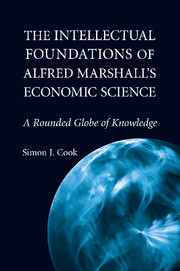Book contents
- Frontmatter
- Contents
- Acknowledgments
- List of Abbreviations
- Introduction
- PART I THE CONTEXTS OF MARSHALL'S INTELLECTUAL APPRENTICESHIP
- 1 Continuity and Consensus: The State of Long-Term Memories
- 2 A Liberal Education
- PART II DUALIST MORAL SCIENCE: 1867–1871
- PART III NEO-HEGELIAN POLITICAL ECONOMY: 1872–1873
- EPILOGUE: “A ROUNDED GLOBE OF KNOWLEDGE”
- Bibliography
- Index
- Titles in the series
2 - A Liberal Education
Published online by Cambridge University Press: 25 October 2009
- Frontmatter
- Contents
- Acknowledgments
- List of Abbreviations
- Introduction
- PART I THE CONTEXTS OF MARSHALL'S INTELLECTUAL APPRENTICESHIP
- 1 Continuity and Consensus: The State of Long-Term Memories
- 2 A Liberal Education
- PART II DUALIST MORAL SCIENCE: 1867–1871
- PART III NEO-HEGELIAN POLITICAL ECONOMY: 1872–1873
- EPILOGUE: “A ROUNDED GLOBE OF KNOWLEDGE”
- Bibliography
- Index
- Titles in the series
Summary
INTRODUCTION
In 1853 a French guest at Trinity College naively asked his hosts if a college fellow was an “élève.” The professor of geology, Adam Sedgwick, put the visitor right. A fellow of a Cambridge college, he explained, is “a Protestant monk, a frère, and nothing more.” Within two decades of this conversation, women students were attending lectures in Cambridge and the religious tests that had discriminated against non-Anglicans were abolished. At the same time, a number of dons were now earnestly engaged in a systematic overhaul of university teaching practices. Furthermore, and as we saw in the preceding chapter, by 1873 Cambridge had become not only a home of advanced liberal political thinking, but also the site of an attempt to construct a new academic self-image as the font of authority in matters of social and political opinion. The transformation of this Anglican monastery had been long in the making, but the critical moment of disestablishment, and the emergence of the University of Cambridge as a secular institution of teaching and research, occurred in the late 1860s and early 1870s. This transformation of Anglican seminary into modern university thus coincided with the first period of Alfred Marshall's association with the Cambridge Moral Sciences Tripos.
A central theme of this book is the relationship between Marshall's developing thoughts on education, on the one hand, and his social philosophy, on the other. Marshall's earliest writings on university reform are discussed in the last part of the present chapter.
- Type
- Chapter
- Information
- The Intellectual Foundations of Alfred Marshall's Economic ScienceA Rounded Globe of Knowledge, pp. 49 - 84Publisher: Cambridge University PressPrint publication year: 2009

